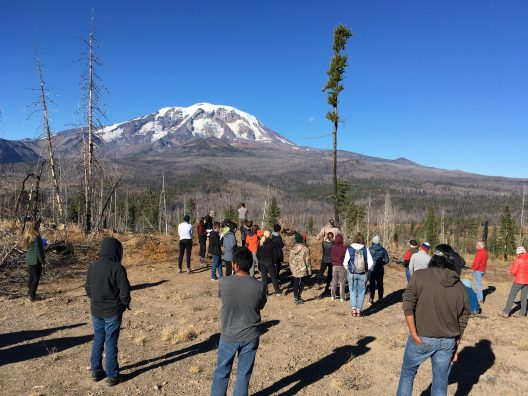Partnerships with Indigenous Tribes and Nations

The University of Washington acknowledges the Coast Salish peoples of this land, the land which touches the shared waters of all tribes and bands within the Suquamish, Tulalip and Muckleshoot nations.
In our work to support stewardship, restoration, and management of natural resources, the School of Environmental and Forest Sciences aims to build into our programs respect for the original inhabitants and stewards of the lands in which we work, recognition and reciprocity in working with sovereign tribal governments, and traditional knowledge that comes from generations of land stewardship.
The School of Environmental and Forest Sciences (SEFS) community recognizes the importance of creating and maintaining strong partnerships with the Indigenous tribes, nations, and peoples of the Pacific Northwest. These tribes were the first stewards of the land on which the SEFS community works, studies, and learns, and continue their stewardship today. This page is a snapshot of connections within the school and university, as well as the research, events, projects and other collaborations SEFS participates in with Indigenous tribes and nations in the Pacific Northwest. The list is not exhaustive, and for more about Native Life and Tribal Relations at the University of Washington, please visit this page.
Affiliations & Collaboration
- Intellectual House and the UW Farm have an MOU that specifically addresses the continued coordination of farming activities to meld jointly the the learning, growing and celebration of foods.
- Intertribal Timber Council (ITC) has a memorandum of understanding (MOU) with SEFS that commits match scholarship support for SEFS undergraduate and graduate students.
- The Na’ah Illahee Fund and UW Botanic Gardens maintain an MOU that provides space in the Washington Park Arboretum and other sites within UWBG for the Fund to grow plants and foods native to Seattle’s Indigenous population.
- The Yakama Nation and University of Washington have had a formal partnership since 2003, which allows students to annually visit the Yakama Nation reservation to learn about tribal practices for conservation and natural resource-related topics. The partnership also established a scholarship fund for Yakama Nation students at UW and support for tribal high school students.
Events & News Items
- “A Glimpse into Indian Forestry” with Gary Morishima at the May 12, 2021 SEFS Seminar
- The Power of Trees is a short video about how trees communicate with one another, produced by the Nature Conservancy in partnership with the University of Washington, University of British Columbia and the Duwamish Tribe. It features SEFS Research Scientist Kathleen Wolf.
- “Restoration and Tribal Engagement – Highlights from the USDA Forest Service” with Tania Ellersick, November 10, 2021.
- Urban Forestry Symposium at Center for Urban Horticulture is an annual event held in the spring that focuses on a timely topic and brings together a diverse audience. In 2022, the symposium will focus on the Coast Salish People with grant funding from the Puyallup and Stillaguamish tribes.
Research & Projects
- Forest Fires in Western Cascadia is a project funded by the NWCASC where SEFS faculty and graduate students, several state and Federal agencies are collaborating with the Tulalip Tribes Natural Resources Department to examine how recent wildfires affect and potentially promote habitat for huckleberry and other culturally important plants across the Western Cascades.
- Kalispel Tribe of Indians have partnered with SEFS since 2016 on a number of research projects.
- North Central Wildfires Project is a study that looks at fuel treatment effectiveness following wildfire seasons in North Central Washington. SEFS research scientists have an active research agreement with the Confederated Tribes of the Colville as a key collaborator in the project.
- “Restoration potential of beaver for hydrological resilience in a changing climate” is a dissertation completed by 2019 SEFS Ph.D. graduate Benjamin J. Dittbrenner, a majority of which was funded by the Tulalip Tribe. Dittbrenner also worked closely with the Tulalip People to relocate beavers and improve habitats for salmon. His research related to his dissertation can be found here.
- Western Klamath Restoration Project is an initiative designed to evaluate how wildfire management can be changed to allow for the restoration of fire as a keystone process, including cultural burning practices of the Karuk and Yurok People. This project is carried out in close collaboration with the Karuk Tribe.
Scholarships and Resources for Indigenous Students at SEFS
- American Indian Science and Engineering Society (AISES) at UW is a local chapter of the national, nonprofit organization focused on substantially increasing the representation of American Indians, Alaska Natives, Native Hawaiians, Pacific Islanders, First Nations and other indigenous peoples of North America in science, technology, engineering and math (STEM) studies and careers.
- Society for the Advancement of Chicanos/Hispanic and Native Americans in Science at UW consists of undergraduate, graduate, post-docs, faculty and staff from various scientific disciplines across the UW campus.
SEFS has three scholarships that are specifically for Indigenous tribal members:
- The Dean Rae Berg Endowed Fund for Student Support provides funding to students who are studying riparian areas and watersheds. Preference is given to official members of Washington state or federally recognized American Indian Tribes.
- The Truman D. Picard Indian Scholarship Program is a joint program with the Intertribal Timber Council (ITC) to provide a full-year tuition scholarship for tribal members who have current or historical ties to Washington and who enroll in a program of study at SEFS. Application information can be found here. See past recipients here.
- The Yakama Tribal Endowed Scholarship Fund provides scholarships to undergraduates who qualify as recognized members of the Yakama Nation and who are studying natural resource conservation and stewardship in SEFS. Learn more and apply here.
If you are a SEFS community member who participates in an Indigenous tribal collaboration or affiliation that is not reflected on this page, please let SEFS know via email.